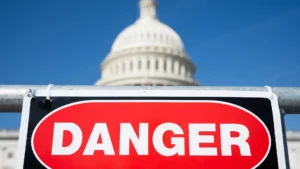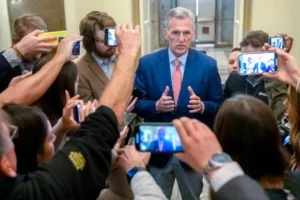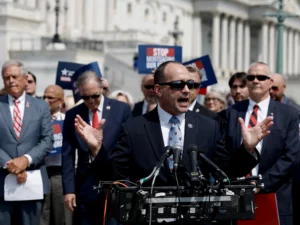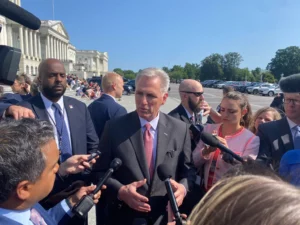Many Americans are angry and concerned about the state of our political system as a result of today’s government shutdown. Once again, Washington’s political impasse prevented the passage of a budget, which led in the shutdown of non-essential federal functions. This is not the first time something like has happened, and it makes us seriously doubt the effectiveness of our democratic system. The causes of the government shutdown, its effects on the American people, and potential solutions to this ongoing issue will all be covered in more detail in this article.

The Reasons Behind the Government Shutdown
Today’s government shutdown is a direct outcome of the deadlock in Congress between the two main parties. On important topics like immigration reform and money for a border wall, the Democrats and Republicans have been unable to come to an agreement. The government has been forced to shut down non-essential services as a result of this lack of agreement that prevented a budget from being passed.

These topics have long been a point of contention between the Democrats and the Republicans. The Democrats have been pressing for all-encompassing immigration reform, which would give undocumented immigrants a route to citizenship. Republicans, on the other hand, have been keen about getting funds for a border wall because they think it is crucial for ensuring national security. The government shutdown was caused by the two parties’ inability to come to an agreement on these topics, which resulted in a deadlock.
The Impact on the American People
Millions of Americans’ daily lives have been significantly impacted by the government shutdown. Many families suffer financially as a result of furloughs or mandated work without pay for federal employees. The closure of national parks and museums denies the public access to significant cultural and recreational resources. The closure hurts small businesses that depend on government contracts or services.

The effects on federal workers are particularly bad. While some are expected to labor without compensation, others are forced to take unpaid leave. This not only puts a strain on these people’s finances and those of their families, but it also lowers morale among government employees. The shutdown’s uncertainty and unpredictability may have a long-term impact on these employees’ mental health.
The shutdown also has an impact on national parks and museums, which are frequently viewed as representations of the history and culture of our country. These organizations are compelled to close their doors, depriving individuals of the chance to understand and appreciate the natural and historical splendor of our country. This affects local economies that depend on tourism in addition to the people who had intended to visit these locations.
The closure has a particularly negative impact on small firms that rely on government contracts or services. The loss of government contracts can be disastrous for these companies, which frequently have slim profit margins. Additionally, the shutdown has a negative impact on the earnings of companies that offer services to government employees, like restaurants and retail establishments.
Along with these immediate consequences, the government shutdown erodes the public’s confidence in the government and its capacity for efficient governance. Many people feel irritated and disenchanted by elected officials’ failure to reach a consensus and keep the government functioning, which erodes their faith in our democratic system.
Potential Solutions
It is imperative that legislators establish common ground and strive toward bipartisan solutions in order to avert further government shutdowns. This calls for a readiness to make concessions and put the needs of the American people ahead of political concerns. Additionally, it calls for a change in political culture where collaboration and teamwork are prized over ideological purity.
A measure that automatically funds the government at existing levels in the case of a budget impasse is one possible solution that Congress may enact. In the event that politicians are unable to come to an agreement, this would guarantee that basic services continue to be provided. A “continuing resolution,” a sort of law, has previously been used to temporarily fund the government and avert a shutdown.

Another choice is for parliamentarians to converse more frequently and openly, looking for points of agreement and common ground before a crisis arises. This might entail frequent gatherings of lawmakers from opposing parties to discuss important problems and potential solutions. Future shutdowns may be avoided, and public confidence in our democratic system may be regained, by encouraging a culture of cooperation and collaboration.
A change in political culture is also required in addition to these legislative fixes. This entails a shift away from a zero-sum game attitude, where one party’s success is viewed as the other party’s failure, and toward a more cooperative strategy. Legislators can work toward identifying long-term solutions to the problems that cause government shutdowns by putting the needs of the American people ahead of political agendas.
Conclusion
Today is a frustrating day for many Americans due to the government shutdown. Once again, Washington’s political impasse prevented the passage of a budget, which led in the shutdown of non-essential federal functions. Millions of Americans are adversely affected daily, suffering financial difficulty and losing faith in the government as a result.
It is imperative that legislators establish common ground and strive toward bipartisan solutions in order to avert further government shutdowns. This calls for a change in political culture where party interests are prioritized over cooperation and collaboration. Legislators can avert more shutdowns and rebuild public confidence in our political system by putting the needs of the American people first and having frank discussions with constituents.
The current state of the administration serves as a sharp reminder of the difficulties facing our democratic system. It emphasizes the necessity of compromising, working together, and putting the needs of the American people first. Together, our elected representatives can meet these obstacles and make sure that our government keeps operating efficiently.
also find some interesting stories at webzalo top info






